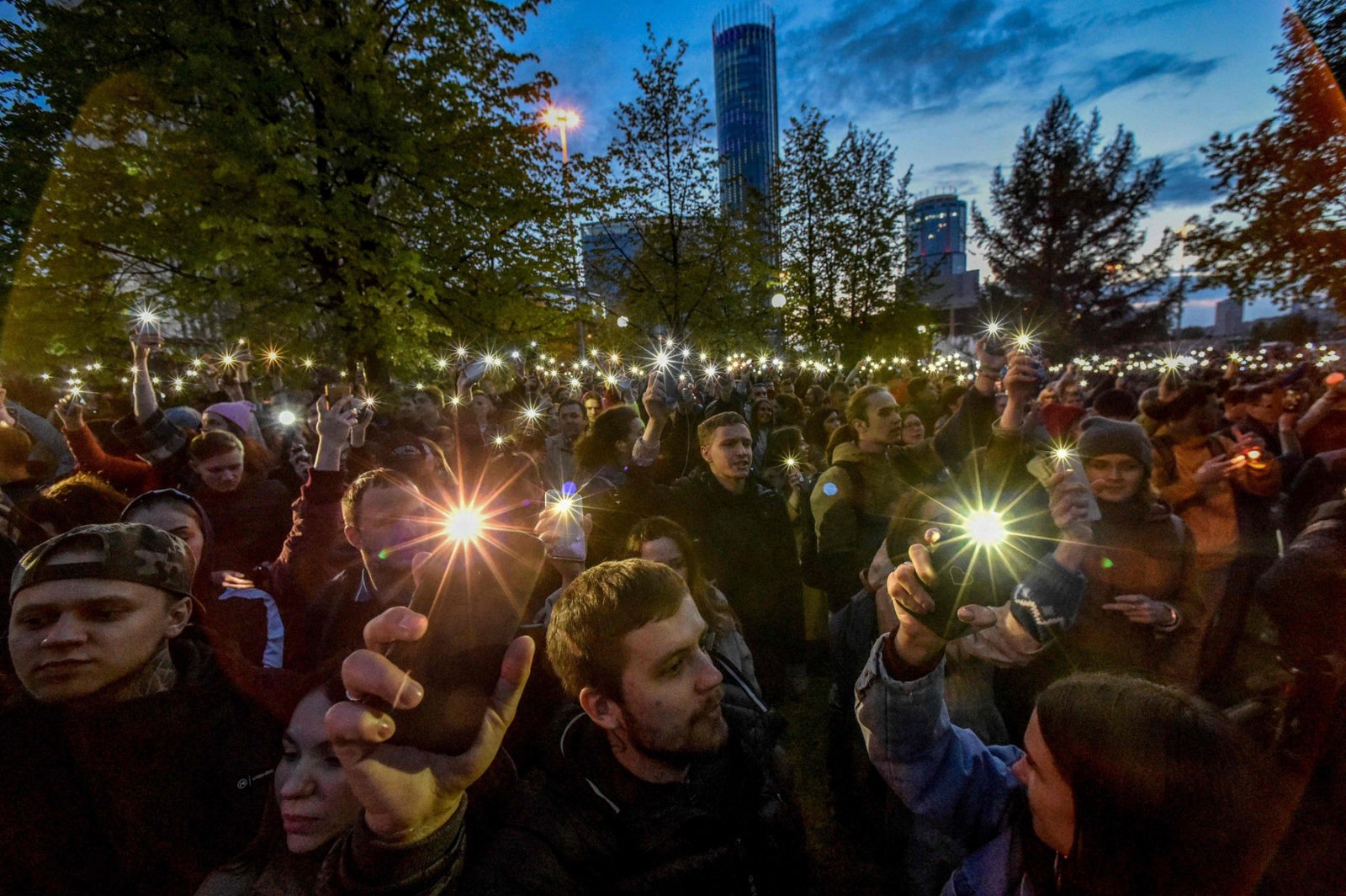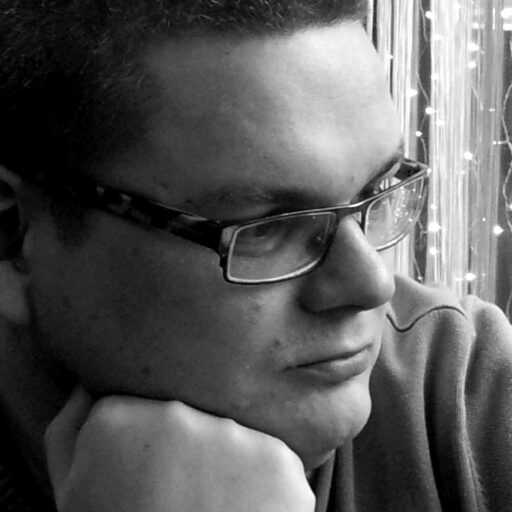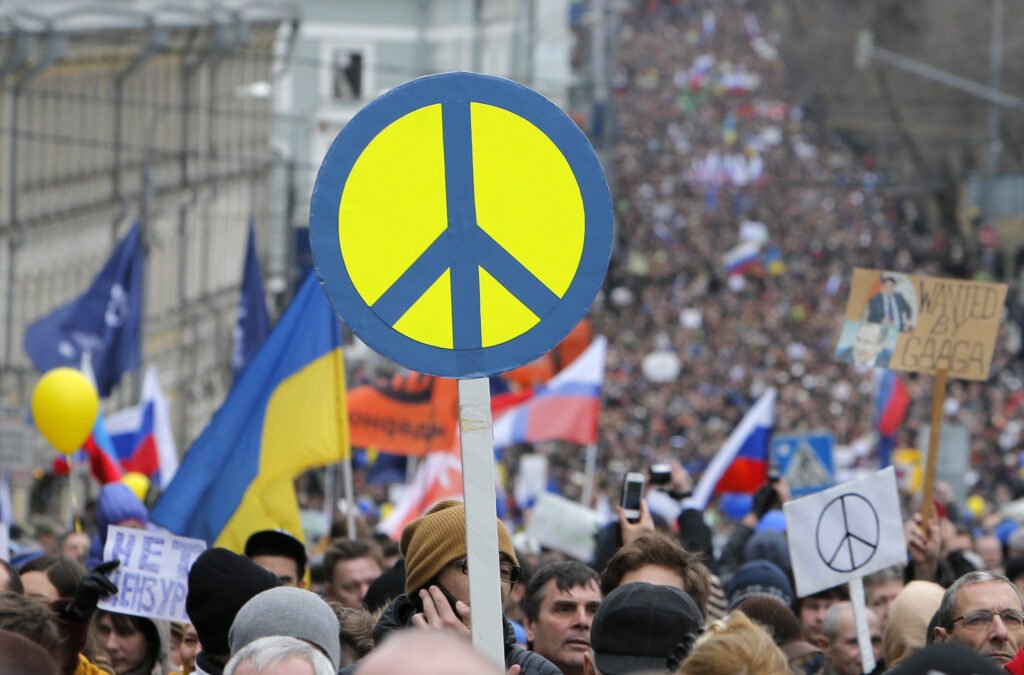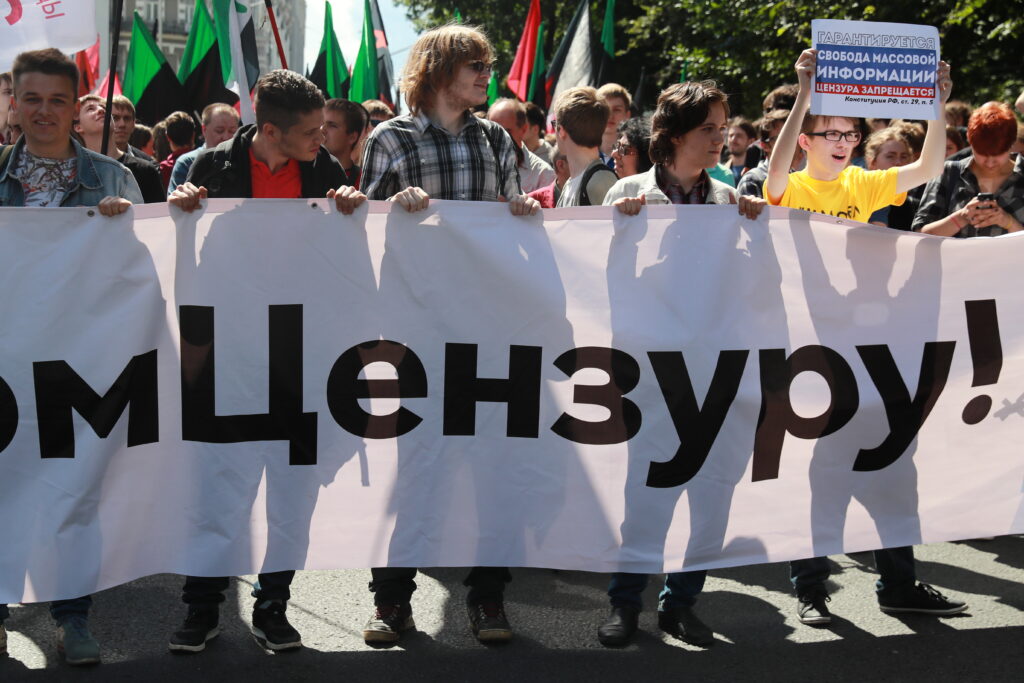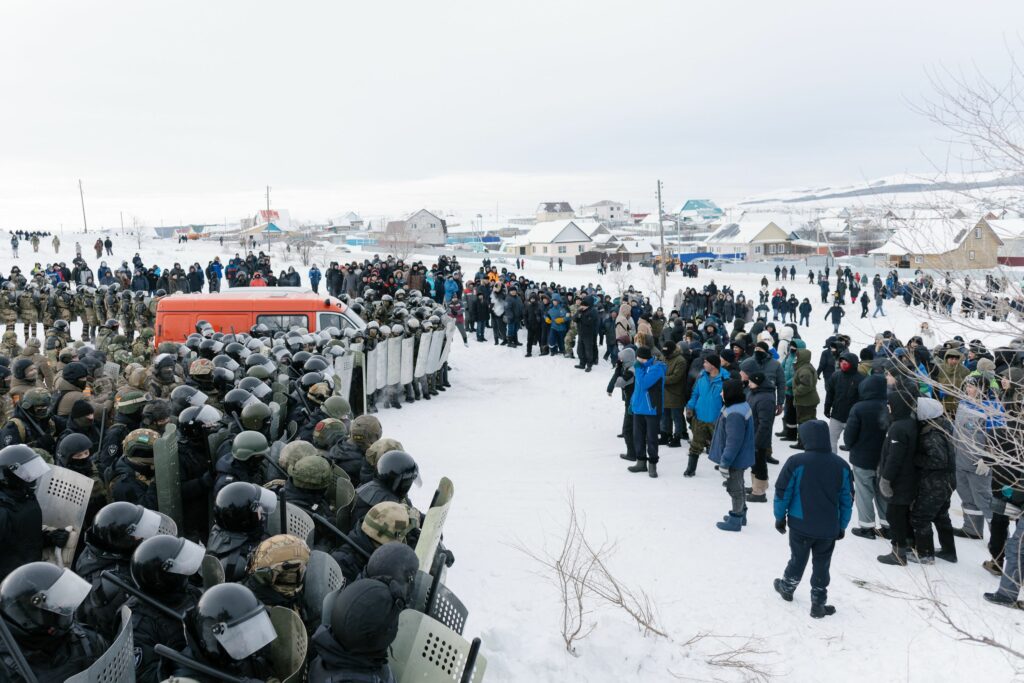Protests against the building of a cathedral in a central square in Yekaterinburg gave rise to a situation that seems unthinkable for contemporary Russia. The authorities at any level have always followed the same logic here: “Do not give in!” It does not matter what the citizens actually demand. Nor how organised or politicised the protest. Any concession the authorities see as a defeat. Even if the demands are reasonable, necessary or inevitable.
From the point of view of a Russian top official, any other decision is a manifestation of weakness, an unnecessary sign of pampering. If we yield to the residents today, they will come up with some new topic for discontent tomorrow; what about the authority of our all-powerful officials then?
Yekaterinburg broke this pattern. Of course, the presidential administration monitored the events in the city and noted the mistake made by local officials. During the first protest, when the residents pulled down the fence surrounding the square, the sponsors of the cathedral from the Ural Copper Company threw trained athletes and hand-to-hand fighters against the gathered crowd. The police remained inactive. In fact, the authorities abandoned the monopoly of violence against citizens by ceding this privilege to individuals. This is a huge miscalculation. No doubt, the practical conclusions have already been drawn; heads have not rolled only because the timing is wrong. Currently, any resignation will be viewed as a victory of the residents in the clash with the authorities; the residents should not have victories. Dismissals will happen, of course. But they will ensue later, when the scandal has subsided.
The situation was nontrivial. There were several days of reflection in Moscow, and then Vladimir Putin was asked at the All-Russia National Front media forum—quite by chance, of course—about what was happening. The President advised a survey to explore the opinion of the “residents of the neighbourhood” and to take decision after. This gave rise to a wave of exciting chaos. Evgeny Kuivashev, the governor of the Sverdlovsk region, understood everything; he promised there would be no church at the square. Alexander Vysokinsky, the mayor of the city, did not understand; he dug his heels in. The Russian Public Opinion Research Centre (VCIOM) published research data showing that over 70% of city residents were against the building of a cathedral in the square.
The protesters fell into some kind of euphoria while their followers congratulated them. Not surprisingly: it is not common for society in Russia to achieve anything from confronting the authorities. There was then a wave of protests across the country against the construction of various disliked facilities (in other words, officials’ fears became reality). The capital fence erected around the square instead of the demolished fencing was dismantled.
However, quite possibly, this cheering is somewhat premature.
From one battle to another
The survey mentioned by Putin as necessary has not yet happened; the VCIOM survey does not count. The first plan was to do it within a week; then to do everything by the end of May. But at the moment, in June, a “working group is being pooled together”. The square near the theatre building continues to be mentioned among the five variants of the church sites proposed to the residents by the Sverdlovsk branch of the Union of Russia’s Architects. Mayor Vysokinsky wrote an open letter to those whom he considers to be the organisers of the protests. He suggested an open discussion and shared his concern: “Before any event related to the discussion of the situation around the cathedral, we are asked: why do we invite public activists? Immediately after these meetings, the media and the Internet start discussing the effectiveness of the conversation and the legitimacy of the agreements reached.” Those words are important and will be referred to later on.
However, the main thing is that the Russian Orthodox Church started an attack. Patriarch Kirill met with President Putin and discussed the situation in Yekaterinburg. The details of the meetings were not disclosed publicly.
In the centrally oriented life in Russia, even the Church has to orient itself towards the words and actions of the head of state. At the All-Russia National Front media forum, Putin, as an experienced politician would do, left convenient loopholes for those supporting the idea to build a church. Those subtle hints were understood.
Can the readers remember where Putin started when he heard about the protests ? “Godless people?” he asked. This became loophole number one. Then, discussing the need to take the opinion of the majority into account, Putin made a slip of the tongue: “Unless we are not talking about registered activists who came from Moscow to make some noise and to promote themselves out there.”
In an interview to the Tsargrad TV channel, the secretary of the Diocesan Council of the Yekaterinburg Diocese, hegumen Veniamin (Rainikov), said that the Church did not abandon the intention to build a temple of St. Catherine, that there were not enough churches in the city, and that there was no question of a “war” against the opponents of construction. He added: “We start this case with prayer, go with our heads held high, not hiding that we want to build a cathedral and do not intend to give up this idea. But we want this to be the feat of the whole city, of all people who love God.” This is a subtle move. The dispute about allocating public space in the city centre is inconspicuously turning into a confrontation with opponents of the construction, or with “godless people”. According to the Constitution, Russia is a secular state, of course. But the concern for the protection of “traditional values” has become an object of worship; a fighter against “godless people” can hope to gain sympathy from the secular authorities; the general public will also offer sympathy, despite rarely or never visiting churches, as they are still quick to call themselves “Orthodox Christians”.
All this has been just foreplay. The second pass from the president in the diocese was also accepted. In the same interview, Veniamin says: “Real professional revolutionaries with political demands arrived there. Initially, the majority of the protesters quite sincerely “defended the square”. But then came the people who immediately pulled the agenda to their side. They clearly showed their face and their methods. It is not difficult to notice those methods, the kind of leaflets they had and where they came from, whose interests they pursued and what kind of information support they had. All of this can and should be analysed, although I do not think this should be done by the Church. It is a job for other people, those who are responsible for the security of country.”
A dispute which first was about a square turned into a dispute about faith. Then the polemic speech morphed into a denunciation.
The church moves onto the offensive
It can be seen with naked eye that the Russian Orthodox Church has extensive political claims. The Church strives to defend its own way of developing the country, and, as an influential public organisation, it has every right to do so. However, the question about the real limits of this influence is a legitimate one. Up to 85% of the Russian population consider themselves Orthodox Christians. At the same time, 3-4% attend churches, even on major Christian holidays. According to surveys conducted by VCIOM, approximately 60% of those who call themselves Orthodox Christians never take communion; up to 80% do not fast. Sometimes sociological research brings anecdotal results. In 2016, FOM found out that 69% of Orthodox Christians share the Catholic dogma about the Holy Spirit originating from both the Father and the Son. In fact, Orthodoxy believes that the Holy Spirit comes only from the Father: this is one of the most fundamental points of divergence between Orthodoxy and Catholicism. For instance, the Levada Center, found in 2012 that up to 30% of Orthodox Christians are sure that there is no God. In general, the educational activities of the Russian Orthodox Church are not all working, despite the opportunities to preach.
The state has been flirting with the Church. Officials have to attend festive religious rites. This Easter in Syzran, for instance, the local officials separated themselves from ordinary mortals by a special veil in the church. (An interesting piece of know-how that can show quite clearly the non-trivial interpretations of Christian values by Russian regional elites.) However, it is easy to assume that the questions about the real influence of the ROC are asked not only by the critics of the church, but also by the holders of high offices, whom the church hierarchs visit to promote certain preferences. And one cannot escape the sad numbers from sociological reports in these secret disputes.
What is left? How to prove one’s influence? Only to run ahead of the state, turning, alas, into something akin to some “Ministry of Ideological Issues”. This is exactly what we have seen in Yekaterinburg. The state authorities decided to give in a bit, not wanting to aggravate the situation further. And then, things that should be done by the state in the traditional logic (where the state never concedes to the citizens) are being taken over by the diocese.
The usual scheme is followed over and over again: the protest is viewed as orchestrated by travelling extremists; it is aimed not to solving problems, but to “destabilise the situation”. And the conversations with extremists are short, to be held by competent authorities that exist to handle them.
The church begins to think of itself as a kind of a reflection of the state. It, too, perceives a concession as a defeat, and is eager to give commands to the security forces.
Politicise it, if nothing else
Let us go back to the words uttered by Mayor Vysokinsky, as quoted above. Supporters of the idea to construct a church in the square have had a view since the very beginning: public hearings were held, and the local council made a decision. Even the surveys, which gave the much-desired results for the builders, have already been conducted. However, nobody recalls them nowadays.
Why is that? Well, that is because Russia is a country with various fictitious institutions, and no legitimate ones. Protesters will notice that hearings can be conducted with “the right” participants being selected in advance. Surveys might not let “the unwelcome ones” in, which guarantees the correct result. This diminishes the possibility to trust the result. The same is true of any opinion polls. Everybody has heard a funny story about how the VCIOM first upset the presidential administration, saying that Putin’s confidence rating fell to a record low, and then corrected it, changed its research methodology, and got a high positive result that satisfied the Kremlin.
The authorities cannot even imagine that the protest may be networked. Vysokinsky addressed not the protesters, but those whom he considers to be the “leaders of the protest” (and those who do not consider themselves to be the leaders because a networked protest has no leaders). The Church supports the authorities’ belief in conspiracy theories instead of fighting to win trust
In the end, there is no ground left for coming to an agreement. The subject-matter of the dispute is politicised; its resolution becomes a matter of political will. Who has more such will? Those who protest against the destruction of public space, or those in power with their allies? Will citizens decide to continue the protests? Will the authorities decide to suppress them? No matter how we answer these questions, we will still be stuck in the impossibility of dialogue. When one side of the conflict has no reason to trust its opponents, and the other side is able to see the protests only as an attempt to challenge their own greatness, inspired by some dark outside forces, then conflict is inevitable.
And what has been the main lesson for the citizens, both inside Yekaterinburg and all over the country? (After all, they have observed the developments and drawn conclusions.) Maybe the following: any confrontation with the authorities should be politicised. This is because the authorities will politicise it, and they will act accordingly. This means, we will have to stay ahead. So that at least there is be more resonance; the authorities are still afraid of noise and publicity.
As a kind of afterword, let me say that on the day when this text was being finalised, protest activist Anna Baltina was being tried at a court in Yekaterinburg, found guilty and sentenced to a major fine for organising an unapproved event. Better than any speech, this fact demonstrates the logic the government is going to follow.
